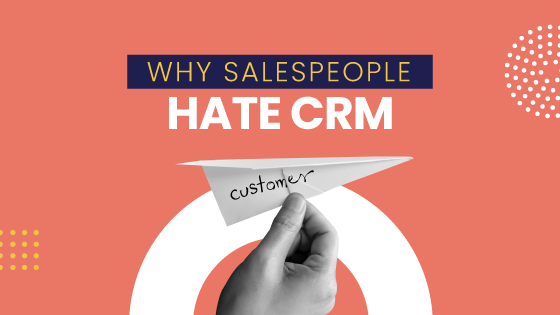






Customer Relationship Management (CRM) systems are in place to make the lives of salespeople easier, but a lot of salespeople hate CRM. This could be because most of the time, sales professionals would rather be having conversations instead of working with software.
Another one of most commonly cited reasons for CRM system failure is lack of enthusiasm and adoption from sales teams. Just because the tool is there, doesn't mean that they feel the need to use it. If data isn't put in, and records are updated, the return on investment is poor.
Other reasons why CRM implementations fail:
- Technology knowledge gaps
- Lack of input from end-users
- CRM doesn't end up streamlining processes or saving time
To avoid CRM implementation failure:
- Make sure goals for CRM are communicated with your sales team
- Give salespeople an incentive for buying into new tech
- Provide sales-related context for CRM use
- Collect and act on feedback from your sales team
- Encourage leadership to set a good example
- Keep the CRM system as simple as possible
In our opinion, the simplicity factor is the most important. Especially now that most sales teams have moved to a remote selling model, CRM systems need to be both powerful and easy to use.
According to HubSpot, 97% of sales leaders believe it's important for business software to be easy to use.
If your CRM system is easy to use, it'll be easier for your sales team to deliver a stellar buying experience. Why? Because they'll be able to keep records on prospects and customers easily updated, which will only add credibility to the conversations they have. They'll also save time by automating some of their day-to-day processes.
Overall, CRMs available on the market are not user-friendly. This costs salespeople-and their organisations-time and money. In fact, 1 in 5 sales leaders claim they've lost opportunities and revenue because their CRM system is too difficult. No wonder there's hesitation around adoption.
Leading by example: Why sales leaders need to buy into CRM
Aside from coaching their teams, sales leaders spend a lot of time on admin. In reality, sales leadership only spends about 22% of their time (on average) managing and coaching their team members directly.
The three things that are taking up most of their time are:
- Reporting on pipeline and overall performance to sales execs
- Creating content for team guidance
- Recruiting new team members
All of these are important and have to be done, but if sales leaders aren't having face time the much needed face time with their team members, team development will continue to fall behind. It's especially frustrating because more often than not, a lot of these admin tasks can be automated.
Implementing new technologies takes time. When time is already so hard to come by, it can be a hard sell to... sales folks (go figure). However, short term pain for long term gain is almost always worth it. Once sales leaders have the right CRM software that actually makes life at work easier for them, it'll be easier for them to lead by example and get their sales team excited about all the useful tools their CRM has to offer.
Excitement around ease of use from leadership will foster wider team adoption, better record-keeping, and less bottlenecks in the sales process.
Managing (buyer) expectations
Buyer expectations are always evolving. People are expecting to find most of the information they need about a product or service well before they even think about chatting with a salesperson. Even though the information they seek is widely available, a lot of buyers are also hoping for the research experience to feel personal to them. To get the personal side of things taken care of, sales and marketing teams need to be working together.
95% of sales leaders state that sales and marketing alignment is important or very important to delivering a great customer experience.
Where does the CRM come in? It acts as a single source of truth for customer data. If the information is accurate and well-maintained on the sales side, it's a lot easier for marketing to understand the big picture. They'll have access to what prospects and customers are looking for, what problems they're trying to solve by considering your product or service, and even areas of improvement that they can execute on through website updates or new marketing campaigns.
The moral of the story is this: Sales teams' hate for CRM stems from the lack of simplicity that most on the market offer, but when it's set up well, both sales and marketing are given the opportunity to work together-and succeed together. A CRM system that's kept up to date makes delivering seamless customer experiences a breeze.









